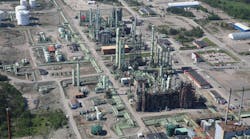Uchenna Izundu
International Editor
LONDON, June 27 -- BP PLC, DuPont, and Associated British Foods have proposed the construction of a 420 million l./year bioethanol plant at Saltend, Hull, UK. The plant is being proposed to help ensure that the UK has 5% of its transportation fuel come from biofuels by 2010. The plant is due to start operations in late 2009 and will use wheat as feedstock.
The partners also plan to develop a 20,000 l./year biobutanol demonstration plant at the same site by early 2009. Investments in the two initiatives are expected to hit $400 million amid growing political pressure to find alternative energy sources for transportation fuels.
"Although initial production would be bioethanol, the partners will look at the feasibility of converting it to biobutanol once the required technology is available," BP said.
The partners are talking to grain trading business Frontier Agriculture about securing locally grown wheat as well as with coproduct marketing company AB Agri in relation to DDGS—a byproduct of bioethanol production. It is expected that formal agreements would be finalized after regulatory approvals are obtained.
Aker Kvaerner and its joint venture partner Praj Industries have won the front-end engineering and design work for the bioethanol plant, with Praj bringing technology and process expertise. The contract follows the companies' recent formation of the BioCnergy Joint Venture, announced June 12.
John Ranieri, head of DuPont Biofuels, said demand was growing significantly for biofuels and it has accelerated the commercial development of biobutanol over the past year.
BP and ABF subsidiary British Sugar would each hold 45% of the plant, with DuPont owning the remaining 10%.
Initial development of biobutanol will start with BP and DuPont sourcing small quantities of biobutanol from China by yearend to test on infrastructure and vehicles.
"This testing will build upon initial laboratory engine tests using conventional butanol which indicated that butanol has similar fuel performance properties to unleaded petrol," BP said. "In addition, work will be undertaken to gather comprehensive data on the environmental footprint and sustainability of this next generation fuel."
BP and DuPont launched a partnership last June to develop, produce, and market a next generation of biofuels.
Contact Uchenna Izundu at [email protected].

